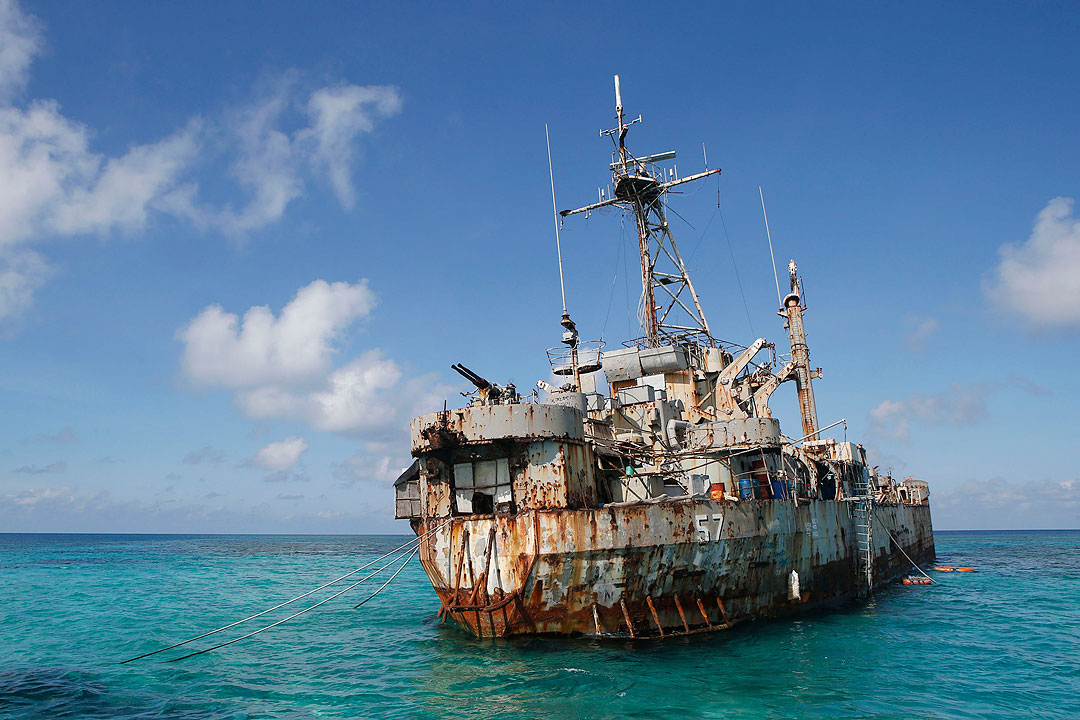US could escort Philippine resupply missions in waterway, admiral says

US SHIPS could escort Philippine vessels on resupply missions in the South China Sea, a top admiral said on Tuesday, describing what he called an “an entirely reasonable option” that required consultation between the treaty allies, however.
The remarks, which are likely to annoy China, were made by Samuel Paparo, commander of the United States Indo-Pacific Command, after a series of sea and air confrontations between the Philippines and China in the South China Sea in the past week.
Beijing has pressed its claim to the disputed conduit for more than $3 trillion of annual ship-borne commerce, while Manila has kept up supply missions, particularly those to a beached naval ship at the hotly contested Second Thomas Shoal.
“Escort of one vessel to the other is an entirely reasonable option within our Mutual Defense Treaty,” Mr. Paparo told reporters on the sidelines of a military forum organized by the Indo-Pacific Command.
He was responding to a query on whether Washington would consider providing escorts to ships from the Philippines taking supplies to disputed geographical features in the waterway.
“I mean certainly, within the context of consultations,” Mr. Paparo added, without giving details of ships likely to be employed for the task.
The Chinese Embassy in Manila did not immediately reply to a Viber message seeking comment.
Philippine military chief Romeo S. Brawner, Jr. said the southeast Asian nation preferred to run those missions on its own, however, making every effort to ensure their success despite what Manila calls China’s “dangerous” and “coercive” actions.
“We are going to try all options, all avenues that are available to us,” he told reporters. “While we can do it by ourselves, we will do it.”
But the Philippines would seek alternatives if it found itself constrained from doing so, he added.
“It’s not just perhaps operating with the United States, but also with other like-minded nations.”
Washington is bound by a Mutual Defense Treaty dating from 1951 to defend the Philippines in case of armed attacks on its forces, public vessels or aircraft in the South China Sea.
That treaty must be interpreted more broadly to tackle a “dynamic and cunning adversary,” Philippine Defense Secretary Gilberto Eduardo C. Teodoro, Jr. told reporters, although it has already proved a “great deterrent” in the South China Sea.
In recent years, the Philippines has complained of China’s use of so-called grey-zone tactics, or coercive actions that are just shy of armed conflict. But China has maintained its actions were professional and lawful.
Mr. Teodoro also urged regional nations to call out China, which he described as the “biggest disruptor of peace,” for its activities in the waterway.
“I believe they’re not undeterrable, because it’s just a question of getting a worldwide consensus,” he said.
Creating sufficient deterrence militarily was critical for the Philippines to show China it is serious about protecting its sovereignty, and which it would fight for, he added.
China claims sovereignty over nearly all of the South China Sea, including areas claimed by Brunei, Indonesia, Malaysia, the Philippines, Taiwan and Vietnam. Beijing has deployed an armada of vessels to protect its claims.
In 2016, an international arbitration court ruled that China’s claim was illegal, in a landmark victory for the Philippines, which filed the case. Beijing has rejected that decision.
PRESSURE ON CHINA
Meanwhile, United States Coast Guard Rear Admiral Andrew M. Sugimoto said the international community should continue to exert pressure on China to stop its aggression at sea, especially if it could backfire and affect its trade with other nations.
“A general world consensus does matter,” he told a virtual news briefing on Tuesday. “China wants to have a vibrant economy, and if nations condemn the actions and they see the economy as something that may be — the goodwill may be damaged in terms of their actions in the world — perhaps they will change… the way they do business.”
Mr. Sugimoto said Washington is keen on helping Manila launch more maritime domain awareness information campaigns amid tensions with Bejing in the waterway.
On Sunday, Manila’s South China Sea task force accused Chinese vessels near Sabina Shoal of ramming and using water cannons against a Philippine fishery vessel transporting food, fuel and medicine for Filipino fishermen.
The Chinese Coast guard said the Philippine vessel “ignored repeated serious warnings and deliberately approached and rammed” China’s law enforcement boat, resulting in a collision.
US Ambassador to the Philippines MaryKay L. Carlson denounced the “unlawful and aggressive conduct” by the Chinese Coast Guard.
“We stand together with the Philippines, and we condemn the actions of aggressive individuals that do such things as ram or try to prevent humanitarian supplies from reaching individuals resupplying their fellow citizens,” Mr. Sugimoto said.
Mr. Teodoro told reporters on Monday China’s actions in the waterway are “patently illegal.”
Mr. Sugimoto said the US Coast Guard would continue working with its Philippine counterpart to boost its capacity to patrol the seas.
“We are looking for whatever the Philippine Coast Guard wants us to help them with,” he said. “We are here for training, capacity building, legal structures, building out the law necessary to support them, any of those things.”
Last month, the Philippines and China agreed on a “provisional arrangement” for resupply missions to Filipino troops at Second Thomas Shoal, after trading blame on raising tensions in the waterway.
Both countries also agreed to set up new lines of communication to improve their handling of sea disputes after resuming talks on easing growing tensions, the Department of Foreign Affairs said last month. — John Victor D. Ordoñez with Reuters



